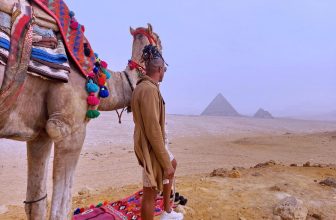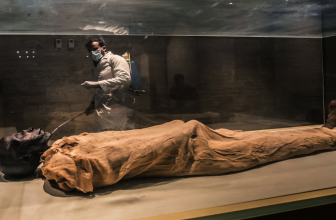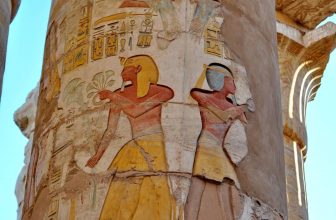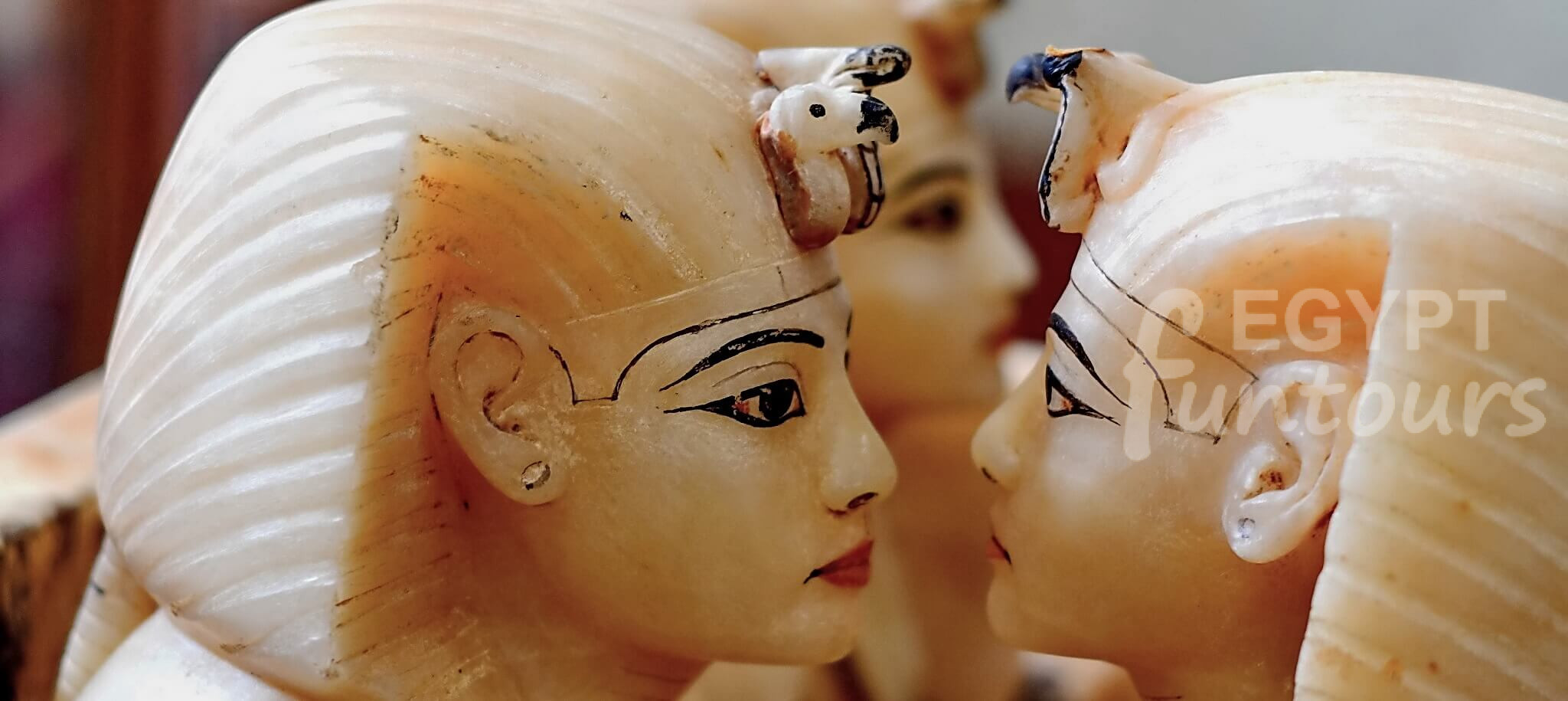Lake Qarun, some 80 kilometers southwest of Cairo in the Egyptian Fayoum region in the Nile Valley, is one of Egypt’s most prized natural monuments and a resource that has aided human civilization for over 8,000 years. It is Middle Egypt’s sole natural modern lake of any size. As a result, it is abundant in both natural and archaeological treasures.
Lake Qarun has a long and illustrious history
Lake Qarun is Egypt’s third-biggest and most renowned lake, after Lake Nasser in the southern portion of the country. It is located 45 meters below sea level in the Fayoum depression’s lowest, northern part. People in Fayoum say that if you haven’t seen the lake, you haven’t seen Fayoum. It is simply known as the Berka within the Fayoum, which means “little lake” in Arabic. The lake offers some of the most magnificent scenery, and taking a small boat out on the water is a fantastic experience.
Lake Qarun, in actuality, is a large saline body of water that is unsafe for drinking. While the southern and eastern coastlines are inhabited, with irrigation systems providing freshwater, the northern shore is barren desert, unregulated, and difficult to access.
The lake has a complex history, and several intriguing ideas exist regarding how it came to be known as Lake Qarun. The lake, as well as the surrounding Qaser Qarun, is claimed to be named after the Greco-Roman city of Karanis, which is located to the east. However, in the thirteenth century, some 800 years after the departure of Karanis, the lake was known as Birka El Seid, or “the lake of fishing” in Arabic. As a result, many people feel the Karanis would have little effect on the lake’s name today. Others suggest a link to the Arabic term Qarn, which means “horn,” and certainly E W Lane reported the lake’s name as Birka Qarn in 1820. He said that the name came from the center island, which features a little horn peak. Lane, on the other hand, was the only one who claimed to know why. Qarun was the name given to the lake by travelers both before and after him.
The most prevalent legend is that the lake and temple were named after a person who lived in the region and are referenced in both the Bible (Numbers 16) and the Quran (Numbers 16). (al-Qasas 76). In the Bible, he is known as Korah, a man who rebels against Moses and is swiftly punished by God by being swallowed up by the earth along with his entire family and belongings. In the Quran, he is depicted as a guy rejoicing in his wealth. This guy was said to have the capacity to touch anything and change it into gold, according to Egyptian legend. Some claim his riches are still buried beneath the surface of the lake. This guy eventually faces God’s vengeance by being swallowed up by the ground. God does not love the exultant, according to the Quran.
Paul Lukas, a Frenchman, recorded an earlier, more detailed, and more illuminating version of this incident. In 1714, while riding across the desert from Al Nazla to visit Qaser Qarun, he was told the narrative by his Bedouin companions. Caron governed this area, which is now desert but once had several towns and over three thousand villages, a long time ago. According to legend, this region had the greatest climate and the most fertile land in the world at the time. Caron, on the other hand, was so terrible that he used magic to destroy his homeland and turn it into the most sterile area in Egypt. He caused a flood first, and then, as the waters receded, he conjured up a huge wind that blew so much sand that the entire area was buried forever, turning into a desert.
This specific fairy tale is very definitely based on events that occurred during the late Roman era. There were many Ptolemaic (Greek) and Roman settlements here. These towns include Theodelphia, Philoteris, and Dionysais, to name a few. Furthermore, most of the region was cultivated until the fall of the Roman Empire, when local mismanagement resulted in the desertification of excellent land and the abandonment of communities. Even recent restoration work, which has turned the lake’s southern coast green again, hasn’t compensated for the massive agricultural land losses sustained during late Roman times.
Qarun might have been a particularly unpopular Roman governor, whose irresponsible governance resulted in the desertification of this country, or a mythical figure who embodied Roman administration in general. When the similarities between the two stories were noted, the biblical and Quranic links were most likely inserted afterward.
Today, Qarun Lake is 45 meters below sea level and covers 214 square kilometers. It has a maximum depth of slightly over 8 meters and a capacity of 800 million cubic meters (west of Golden Horn Island). It has a length of 42 kilometers and a width of 9 kilometers at its widest point. The lake receives about 370 million cubic meters of drainage water each year, and because the lake level has remained relatively constant and there are no known outflows, this amount is also used to calculate the yearly rate of evaporation. As a result, if the lake’s water source were shut off, it would dry up in two years.
The rapid rate of evaporation has resulted in a salt concentration; the lake is now as salty as seawater, with a ratio of roughly 34.5 parts per thousand and a pace of 0.4 parts per year. Seawater has a density of 34 to 37 parts per thousand, whereas Jordan’s Dead Sea has a density of 300 to 330 parts per thousand. In the east and south of the lake, where the two main canals bring in freshwater, the water is less saline.
The lake, as large as it appears now, is a puddle in comparison to its previous splendor. It was undoubtedly considerably larger in the past than it is now, although just how enormous it was and at what moments in its history are debatable. The many ideas are based on evidence that is sometimes archaeological, sometimes historical, sometimes hydrological, and sometimes geological. Many residents of the Fayoum believe that the biblical patriarch Joseph emptied the vast lake and adjacent wetlands. The Fayoum was dubbed “Joseph’s Land,” and the canal that connected it to the Nile was dubbed “Joseph’s Water,” or “Bahr Yousef” in Arabic.
In his 1938 book “Contributions to the Geography of Egypt,” John Ball mapped out a thorough history that has only been somewhat refuted by more recent research. We think the Fayoum Basin was originally dug by wind erosion in the early Pleistocene epoch, and that erosion of a Nile side-gulley led to the Nile floodwater breaking through what is now the Lahun Gap 70,000 thousand years ago, based on Ball’s description. During the low season, the depression filled with water pouring into the lake. Following then, a series of level fluctuations occurred, which were connected to climate variations, changes in the Nile’s level, or adjustments in the Nile’s route. The success or failure of numerous early agriculture or fishing groups on the lake coast was influenced by Neolithic fluctuations.
The lake may have fallen as low as two meters below sea level during the Old Kingdom, and was no longer in open connection with the Nile, due to a widespread recession that began around the beginning of the Dynastic period. Amenemhat I, who was connected with the Greek king Lamarres or Moeris, re-flooded the lake in the 12th Dynasty, bringing its level up to 18 meters above sea level. He accomplished this by enlarging and deepening the existing waterway between the Fayoum and the Nile, now known as Bahr Yousef, and by building a five-kilometer embankment from the northern side of the Lahun Gap at al-Lahun. The lake took around five years to fill once the channel was excavated.
The initial goal of clearing the channel may have been to drain the low-lying marshes along the Nile valley’s Western desert edge, but the end result, and most likely the main goal of the massive scheme, was to create a Nile floodwater overflow, thereby protecting Lower (Northern) Egypt from the disaster of excessively high floods. The lake would then operate as a reservoir during the low season, after the Nile had flooded, and restore the water to the Nile Valley. In effect, Amenemhat I reestablished a free connection between Fayoum Lake and the Nile River.
The Fayoum, which is roughly 18 meters above sea level, is home to the whole 12th Dynasty. The lake level changed periodically, therefore the Biahmu colossi, at exactly 18 meters, stood on dry land at times and was surrounded by water at others. The capital, Shedet ((Kiman FGaris), which is on high ground in the southeast, was unaffected by the floodwater for the whole year, but its land was readily watered by side channels from the main canal, requiring no mechanical lifting.
When Herodotus visited it in the mid-fifth century BC, the lake, known to the Greeks as Lake Moeris from the Egyptian term mer wer, meaning “big lake,” was still at the same level or even higher, and stayed that way until early Ptolemaic times. Ptolemy, I began the large-scale reclamation of the Fayoum, which is assigned to Ptolemy II. The southern portion of Amenemhat I’s barrage from Al Lahun to Gebel Abu Sir was decommissioned, and a new barrage was constructed roughly from west to east, across the mouth of the Lahun gap and linking the previous barrage at Al Lahun. The flow of water into the Fayoum was now closely regulated thanks to sluices in the new barrage across the Bahr Yousef, and only water necessary for agriculture was let in. It may have taken up to 30 years to reduce the lake’s level to two meters below sea level, the same as it was under the Old Kingdom. From 300 BC until the beginning of the Christian era, it remained at roughly the same height.
The Ptolemies were able to recapture around 1,200 square kilometers of fine, fertile soil, resulting in a regional agricultural boom, extensive colonization projects, and the establishment of several new cities. Some area north of the lake was irrigated directly from the lake itself using lifting technology, while territory south of the lake was basin irrigated from canals branching out from the Bahr Yusuf.
Many canals, notably the Bahr Yousef, got heavily silted up throughout late antiquity. As a result, a considerable area was lost to the desert, and the reduced inflow led the lake’s level to plummet even lower, dropping to 36 meters below sea level by the end of the Roman period. The water’s salinity began to rise as well. By the fourteenth century, irrigation with lake water had become impossible, and farming on the northern side of the lake had all but disappeared. Lucas observed that the lake water was harsh in the west and delicious in the east in 1714. Dr. Martin noted that his horses drank from the eastern end of the lake in January 1801, but that their camels were struggling on a salt crust at the western end a day later. The lake was probably roughly 40 meters below sea level at the time.
When the water level came into balance with the enormous water sheet under the Libyan Desert around 40 meters below sea level, underground drainage from the lake, which slowed the increase in salt, presumably halted around 1890. Since then, salinity has risen at a faster rate, to the point that practically all of the original freshwater fish species have died off. For much of the last century, the Lake’s level has been meticulously maintained at 45 meters below sea level. Lake Qarun is now an Egyptian Protected Area, essentially a national park.
Join us in our excellent Trips to Qarun lake national park and other beautiful attractions of Fayoum oasis














